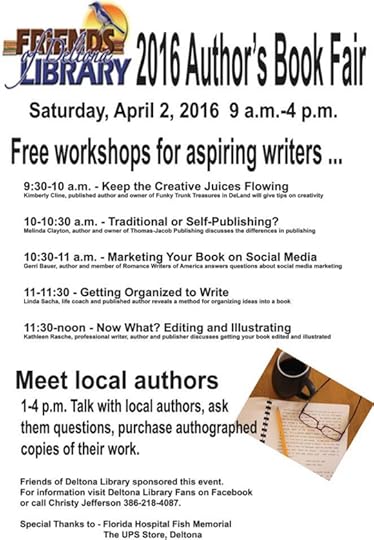Malcolm R. Campbell's Blog, page 195
February 16, 2016
Deltona Library Book Fair Set For April 2
Why I became a writer – this is the whole ‘truth’
from the archives
My life began at a Gulf Oil Service Station at Immokalee, Florida, back in the days when the attendants came out with a whisk broom and swept the beach sand out of your car while they pumped your gas for you.

Papa at work
Word is, I was swept out of the back seat of our 1949 Nash even though I didn’t look like beach sand. Since authorities were certain that even though I was an ugly five-week-old baby, somebody would claim me sooner or later, they put me in the service station window with a sign that said IS THIS YOUR BABY?
Word is, I was there several weeks and learned how to use a whisk broom. By the time I had a resume, whisk brook operator didn’t cut it with modern day gas stations where nobody did nothing for nobody. I also learned how to tell the difference between swamp gas, ghosts and aliens from other planets. However, the feds have classified this and so I can’t tell you unless I move out of the country–like, to Russia maybe.
An aging alligator couple took pity on me and raised me as one of their own. They taught me to swim and they taught me to lurk in the water with only my eyes showing so that I could grab hapless ducks in my teeth and bring them home for Duck a la Orange.
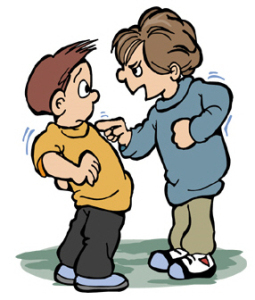
Mugsy Walters Requesting Lunch Money
When I got to high school, playground bullies made fun of my swamp dialect and taunted me with phrases like “see you later alligator” and “after while crocodile.” That’s what they said after they stole my lunch money.
Papa Gator said, “Son, you’re never going to bring home the bacon with your teeth like your brothers and sisters. You’re going to have to use your wits.” That advice has served me well.
I convinced the playground bullies of several truths: (1) When I grew up, I was going to be a famous writer and would put all of them in my books for better or worse, (2) Looking good in a novel was a good way to pick up chicks, something they needed to think about since their teeth weren’t large enough to grab anyone at the prom, (3) Papa Gator knew where they lived.
No doubt, truth number one (1) got their attention; that, along with my weekly column in the school newspaper called “Alligator Alley Gossip.” Everybody read it, but nobody wanted to be in it: Is that hickey on a certain red-haired girl’s neck a true love bite or did somebody forget their lunch again? Once again, a lover’s lane romeo with the initials W. S. forgot the distinction between “Jail Bait” and “Gator Bait.” Note to S. T.: old lady Anderson doesn’t keep the test answers in her drawers any more.
The world has moved on from the Immokalee I once knew. The Gulf Oil Station was torn down years ago. Seaboard closed down the rail line. Most of the gators, including many who still remember my name, have retreated deeper into the swamps. And now, the people coming to town aren’t there for the fishing, but for the Zig Zag Girlz Blackjack at the Seminole Casino.
The basic truth comes down to this. If you can’t earn a living with your teeth, you need to go out and find an occupation that fits your station in life, one that honors how you were brought up. Even those who don’t know my first adult meal was a pine warbler on toast or that I still make slaw with swamp cabbage, walk carefully around any writer who just might put them in his books.
Papa Gator would be proud.
–Malcolm
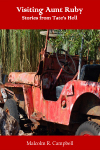 Malcolm R. Campbell is the author of the “Tate’s Hell Stories” series which includes the new Kindle short story “Visiting Aunt Ruby.” Papa Gator has friends in Tate’s Hell Swamp, so if you’re in the Carrabelle area, stop in and say hello.
Malcolm R. Campbell is the author of the “Tate’s Hell Stories” series which includes the new Kindle short story “Visiting Aunt Ruby.” Papa Gator has friends in Tate’s Hell Swamp, so if you’re in the Carrabelle area, stop in and say hello.


February 15, 2016
Write down your memories for your kids. . .
…but you better have something extraordinary to say if you want to convince me a published version of those memories will be a bestseller.
When I was a kid, I read books about explorers who kept journals about where they went and what they saw. Some of them happened to know how to draw and included illustrations showing where they went and what they saw.
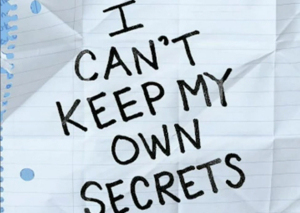 I was just an everyday kid going to school. Nothing unique there. In spite the fact most of the people who knew me at school would describe me as nondescript, I kept logs (I liked sea stories) and journals (because guys didn’t keep diaries with hideous phrases such as “Dear Diary, Jenny looked at me in between classes today like she wished we were alone in the dark”).
I was just an everyday kid going to school. Nothing unique there. In spite the fact most of the people who knew me at school would describe me as nondescript, I kept logs (I liked sea stories) and journals (because guys didn’t keep diaries with hideous phrases such as “Dear Diary, Jenny looked at me in between classes today like she wished we were alone in the dark”).
The thing is, I was already too much aware of the fact that writers’ journals and private papers often got published after they were dead and (hence) unable to stop greedy heirs from trying to make a buck off stuff that was supposed to be private. Practically speaking, what this meant was that I made myself look better in my journal entries than I was.
“How will this read in the future?” I asked. This kept my journals from being the cathartic process of self-discovery modern-day advocates of journaling claim is possible. You’ll heal. You’ll change your life. You’ll grow. Maybe so, but truth wasn’t for me.
Consequently, I saved the healing/growing process for my fiction where I tell a story about somebody else while including disguised secrets about myself that I would never dare write down in a journal. These days, everybody and his/her brother is writing a memoir, including people who’re still in high school. But why?
I can’t decide whether all these memoirs by “regular people” are a service to human kind or examples of arrogance run amok.
Maybe some day my kids and your kids will be interested in some of our best true stories about life in an era that will seem very foreign to them by the time they’re reaching middle age. Maybe they’ll want to know about their family and where there ancestors came from and what it was like to live during those dark ages times when telephones were attached to the wall with a cord and didn’t show movies.
But, should you publish those memories as a book? I have no answer to this because–being 37.5% psychic–I know that the moment I say that we shouldn’t, people will come up with a hundred examples of “regular people’s” memoirs that had a great impact on the world. That can happen.
I do like the idea of continuity, the kinds of things we read about in oral history projects that give folks in later generations a sense of what life was like for people in their parents and grandparents generations. Perhaps we can provide that kind of information for our kids. Maybe they’ll never read it. We may never know.
My folks used to send a Christmas letter out every year. Years later, my brothers and I would actually find ourselves referring to these old letters because we could no longer remember what year we saw Niagara falls or when our father received an award. If I’d kept a journal, I would know all this.
If I did know it, I find it hard to imagine that thousands of people would race to the bookstore to buy even a well-edited version of that journal, along with a snappy title and a jaw-dropping cover.
An author’s fiction already contains enough secrets in it than he dares disclose any other way.
–Malcolm
 Malcolm R. Campbell is the author of “Visiting Aunt Ruby,” and Kindle short story that he’ll swear on a stack of Bibles didn’t happen in “real life.”
Malcolm R. Campbell is the author of “Visiting Aunt Ruby,” and Kindle short story that he’ll swear on a stack of Bibles didn’t happen in “real life.”


February 13, 2016
Man with multiple lovers gets screwed on Valentines Day shopping trip
Junction City, TX, Star-Gazer News Service, February 13, 2016–A local man trying to juggle gifts and cards for multiple lovers arrived at Lost Horizon Hospital & Mortuary near death here today after simultaneously confronting Bambi, Monique, Caroline, and a woman calling herself “The Dark Lady” on aisle three between the beef jerky and the pet treats.

Darcy is currently indisposed.
When Dan Darcy, of 148 Bonnie Meadow Road, arrived at the emergency room during the hospital’s 12th “code black” of the year, doctors took one look at him and assumed he lost the race at Pamplona.
“How many hooves do all the bulls in Pamplona have?” asked Dr. Grey, rhetorically as she attempted to intubate a mouth that turned out to have run into multiple fists.
Using sign language, Darcy said, “Watch out for The Dark Lady.”
“Everyone assumed he was hallucinating,” said attending physician “Bill Smith” who refused to give his real name due to “malpractice issues.”
“Screw The Dark Lady,” Smith reportedly added.
“Your place or mine?”
“Oops, no offense intended, m’am.”
According to first responders, the four women showed up at Walgreens where they shouted “hi lover” in unison before realizing they were a choir.
“Try as he might, he couldn’t preach to us once we caught him with a Valentines Day card for each of us. Inside, he scrawled ‘HAPPY VD’ in a hurry because he probably had to hurry home to his wife, AKA ‘Clueless in Abilene,'” said Bambi, speaking in secret after being assured her name would not be used in the newspaper.
Monique told reporters that “an honest philanderer would go to another town to buy gifts for his paramours so this kind of awkwardness doesn’t happen. I mean, golly, The Dark Lady is my mother. I always thought she was out delivering meals on wheels.”
Hospital spokesmen who were laughing too hard to keep their priorities straight, refused to confirm or deny that a woman that staff believed to be “Clueless in Abilene” begged the hospital to let Mr. Darcy go on to his great reward as soon as she filled out a fast-track DNR form.
“I just want my friends and family to know that I’m not the ‘Caroline’ they know but a different ‘Caroline’ from another planet or maybe from some God forsaken place such as Tulsa,” said Caroline.
Reportedly, my Darcy is resting in guarded condition beneath his wife’s thumb.
–Story by Jock Stewart, Special Investigative Reporter


February 12, 2016
Review: ‘The Improbable Wonders of Moojie Littleman’ by Robin Gregory
The Improbable Wonders of Moojie Littleman, by Robin Gregory ( Mad Mystical Journey Press, December 14, 2015), 294 pp.
Moojie has so many strikes against him that survival of any kind seems improbable. He’s born with physical disabilities; is slow to talk and when he finally does, he stutters; he loses his mother and his father won’t have him; almost everyone taunts him; and he’s sent to live with a cantankerous grandfather at a place called St. Isidore’s Fainting Goat Dairy. If being named “Moojie” was the first curse, being sent to the dairy was just about the last straw.
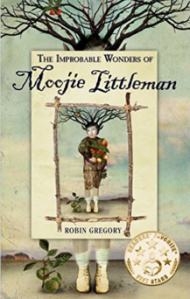 But were more last straws to come.
But were more last straws to come.
His grandfather drinks, curses, works Moojie hard in spite of the young man’s weak legs and weak arms, constantly threatens to send him to an orphanage, and passionately has it out for the so-called “hostiles” who live in the surrounding forests.
While the hostiles first appear to have come from the land of faerie, Moojie discovers they’re a magical race tasked with demonstrating harmony in our world. He hopes their clan will accept him because, among other things, he has no true family to call his own. But will they trust him? He can scarcely trust himself. But he’s learning, and the realism of this process is well handled by the author.
Moojie, his grandfather, his meddlesome aunt, the clan members, and the townspeople are defined in spot-on detail. They have depth, though Moojie believes he’s shallow and inept at the beginning of this well-crafted and beautifully told tale. The book’s magical realism accentuates the abilities of the off-world clan family as well as the dormant gifts Moojie has been blessed (or possibly cursed) with.
Many will call this a coming-of-age novel. Yes it is. But that assessment is much too stale for such a fresh, rich story. The story is about making choices and the probable transformations that follow them. Other than a bit of sentimentality at the end, Robin Gregory’s novel is a wonder about wonders and highly recommended.
–Malcolm
Malcolm R. Campbell is the author of magical realism and contemporary fantasy novels and short stories.


February 9, 2016
Is having your book ‘out there’ enough for you?
This article (Only 40 Self-Published Authors are a Success, says Amazon) has prompted some people, including me, to ask why Amazon defines financial “success” as having sold a million e-books over the last five years. Self-published writers tend to price their books between $3 and $5, and often at only $0.99. They can earn up to 70% of the retail price. In my view, one can sell a lot fewer than a million copies and still be earning a decent income.
 At the same time, the article has prompted others to say that just having their books “out there” is all they need to feel successful. They feel that if they do a great job of writing a story, have a great editor and a wonderful cover artist/designer, they are fine with the results of their avocation. Far be it from me to criticize that view. One might have similar feelings about creating music, making art, sewing quilts and other creative arts and crafts.
At the same time, the article has prompted others to say that just having their books “out there” is all they need to feel successful. They feel that if they do a great job of writing a story, have a great editor and a wonderful cover artist/designer, they are fine with the results of their avocation. Far be it from me to criticize that view. One might have similar feelings about creating music, making art, sewing quilts and other creative arts and crafts.
I am grateful for each reader, for every honest reviewer, for having a wonderful publisher and editor, and for all of those who’ve interviewed me, talked about my books, and otherwise been supportive. All of that is a viable form of success.
If you sense that a “however” is coming, you’re right.
However
Even the IRS considers that if we never show a net profit as a writer, we aren’t really a business. Writing books isn’t a free undertaking. One has to buy reference books, a computer, an Internet connection, office supplies, travel to locations where the novel is set, and (if self published) pay for your editor and cover designer. If these costs exceed the amount of money from royalties and direct sales, then one is running at a loss. Whether one calls his or her writing a business or an avocation, those costs can reduce the happy feeling one gets for having his or her books in print and getting some good reviews.

The people who run stores will seldom hear about self-published books.
I grew up in another era, long before e-books and Kindle Direct Publishing, so I believe writing (fiction, especially) is always a long-shot proposition. One can never expect to earn a John Grisham or a J. K. Rowling income, or even enough to write full time. Most writers can’t survive on writing income alone and, as more and more readers expect 99 cent or free books, it’s getting harder and harder for most writers to cover costs, much less see real profits. So, my “however” is that if one wants to have a successful writing career, that “success” has to at least provide enough income to cover expenses.
Creative people are somehow expected to take pleasure in the work they do even if they are bankrupt. I suppose you can say that writing passion exceeds having a viable business, or that we feel at our best when we’re creating what we create. However, while I don’t need to sell a million e-books to feel successful, I do need not to be running in the red. I don’t think that’s too much to ask in order to feel successful in a career where–some have said–winning the Powerball is a better bet.
So, having my books “out there” is not enough. It’s wonderful, but if “out there” is all there is, it’s not paying the bills. Worse yet, it’s costing writers money and taking them away from their families.
If you’re a reader and/or a writer, do you think it’s possible to feel successful as a writer–or any other creative artist–if you’re expenses are higher than your sales?
–
See also: Falling book prices could force authors to abandon their keyboards – The article notes Amazon’s penchant for running at a loss with low prices and low payouts to writers.
–Malcolm


February 6, 2016
On location: Carrabelle, Florida

Carrabelle waterfront as it looked in the 1960s. – Photo from the Florida Memory Project.
Carrabelle sits on the gulf coast in the Florida Panhandle and has three rivers running through it. I lived an hour away in Tallahassee from the first grade through college and loved those rivers, Carrabelle River, Crooked River and Ochlockonee River. I also liked the unspoiled coast–still called the Forgotten Coast–and the nearby Tate’s Hell State Forest. Except for the unfortunate logging in Tate’s Hell, which is currently in recovery, the beaches, swamps and rivers were more pristine than those in the crowded peninsula section of the state.
Across the bay from Carrabelle is Dog Island. In the 1950s and 1960s, my Scout Troop often went camping there. My best friend and I went there by speed boat and sail boat to explore the dunes along its coast. The island remains sparsely developed while the nearby St. George Island has more traffic since it’s connected to the mainland by a bridge. I was against the bridge when it was being built, but they the state department of transportation didn’t ask me.

Carrabelle as it looks today.
In addition to the great seafood and the well-publicized “world’s smallest police station,” visitors will enjoy Alligator Point, Carrabelle Beach, St. George Island State Park, Ochlockonee State Park, and the Ft. Gadsden Historic Site. Highway 98 is a scenic coastal road and highway 67 is a scenic route through state and national forests. With 1300 residents, Carrabelle is not crowded except on warm summer days when people drive down from Tallahassee to enjoy the beaches.
I figuratively traveled to Carrabelle last week while working on a new short story set there in the late 1960s. I wish it weren’t seven hours away from my home in northwest Georgia. I would have taken a fresh look at a place out of my childhood for hushpuppies and mullet–along with the ambiance. Called “Visiting Aunt Ruby,” my short story will be released on Kindle by Thomas-Jacob Publishing February 12 as part of our Stories from Tate’s Hell series.
 If you live closer to the gulf coast and haven’t been to Carrabelle, go take a look, and while you’re there, climb to the top of the Crooked River Lighthouse and explore the World War II museum at Camp Gordon Johnston. If you dare to hike into Tate’s Hell and end up getting lost, don’t call me on your cell phone (if it even works there) and ask me how to get the hell out.
If you live closer to the gulf coast and haven’t been to Carrabelle, go take a look, and while you’re there, climb to the top of the Crooked River Lighthouse and explore the World War II museum at Camp Gordon Johnston. If you dare to hike into Tate’s Hell and end up getting lost, don’t call me on your cell phone (if it even works there) and ask me how to get the hell out.
“The history of Dog Island and Carrabelle, Florida, includes a wonderful mix of Indians, shipping, bootlegging, logging and battles. This charming town was a fishing village prior to the Civil War, isolated from the rest of Franklin County by the lack of bridges and paved roads. After the war, it became an internationally known lumber town, shipping wood from the hundreds of thousands of acres of surrounding virgin forest. Turpentine, distilled from pine sap, was shipped via schooners from the natural deep water port on the Carrabelle River. ” – Get Hooked on Carrabelle
— Malcolm
Malcolm R. Campbell is the author of “Conjure Woman’s Cat,” a 1950s-era novella set in the Florida Panhandle. It features a conjure woman who claims to be older than dirt, but not too old to fight the KKK when her town’s police force refuses to investigate the murder of a Black girl.


February 5, 2016
Briefly Noted: ‘Downwind: a People’s History of the Nuclear West’
Downwind: a People’s History of the Nuclear West, by Sarah Alisabeth Fox (Bison Books: November 2014), 304 pp.
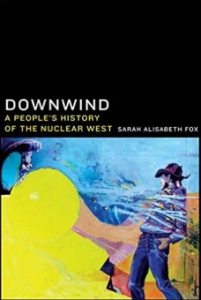 The opening lines of this book begin a frightening story: “By the time five-year-old Claudia returned to her swing set, a strangely colored cloud was all that remained of her flying saucer. Years later, she leaned the apparition she had seen in the sky was not a UFO but the mushroom cloud of a nuclear explosion. Her childhood home in southern Utah was about a hundred miles east of the Nevada Test Site.”
The opening lines of this book begin a frightening story: “By the time five-year-old Claudia returned to her swing set, a strangely colored cloud was all that remained of her flying saucer. Years later, she leaned the apparition she had seen in the sky was not a UFO but the mushroom cloud of a nuclear explosion. Her childhood home in southern Utah was about a hundred miles east of the Nevada Test Site.”
Author Sarah Fox goes on to say that the site which was operational between 1951 and 1992 was one of the world’s most heavily used nuclear weapons testing areas.
From the Publisher
Downwind is an unflinching tale of the atomic West that reveals the intentional disregard for human and animal life through nuclear testing by the federal government and uranium extraction by mining corporations during and after the Cold War.
In chilling detail Downwind brings to light the stories and concerns of these groups whose voices have been silenced and marginalized for decades in the name of “patriotism” and “national security.”
With the renewed boom in mining in the American West, Fox’s look at this hidden history, unearthed from years of field interviews, archival research, and epidemiological studies, is a must-read for every American concerned about the fate of our western lands and communities.
From the Reviewers
“Comprehensive and incisive, Downwind also adds heart and soul to an epic story of resilience in the aftermath of reckless arrogance. Sarah Fox gives the history of the nuclear age back to the people who had it written in their bones. The testimony she captured is both shocking and inspiring.” – Chip Ward, author of Canaries on the Rim: Living Downwind in the West
“Fox’s narrative forces the reader to choose whether to accept the official version of events or to believe the people who lived downwind of the nuclear tests and who worked in the uranium industry. There is no middle ground in her argument. According to Fox, repeated nuclear tests led to cancers and other diseases and to the deaths of innumerable people.” – David Mills in “Montana: The Magazine of Western History,” Winter 2015.
 In her January 27, 2016 blog post, Day of Remembrance for Downwinders: the 65th Anniversary of the Inception of Nuclear Testing in Nevada, Fox says that there were over 900 nuclear tests at the site. Her accompanying graphic illustrates where wind patterns carried the resulting pollution.
In her January 27, 2016 blog post, Day of Remembrance for Downwinders: the 65th Anniversary of the Inception of Nuclear Testing in Nevada, Fox says that there were over 900 nuclear tests at the site. Her accompanying graphic illustrates where wind patterns carried the resulting pollution.
In both the blog and the book’s introduction, she says that the proceeds from the sale of the book are being donated Heal Utah, “an environmental non-profit that promotes renewable energy and protects Utah’s public health and environment from nuclear, toxic, and dirty energy threats.”
In an era when the United States’ nuclear weapons program is supposedly a relic of the past, Downwind reminds us that the sins of the past are very much still with us even if we never again use a nuclear weapon. The book has a 4.3 review rating on Amazon with five five-star reviews and one one-star review. The one-star reviewer states that Fox’s stories are not only not new, but that her information about reported illnesses and deaths isn’t accurate. If the author has refuted this claim, I haven’t found it. It’s worth noting that a commenter believes this review is based a less-than-accurate, self-published book.
On balance, the book has stories we should know about if we haven’t heard them already. If readers follow this up by looking at the Heal Utah site, they’ll see that the past is a warning to those currently mining uranium in close proximity to the Grand Canyon.
–Malcolm


February 4, 2016
Men stage “cry in” for old ‘Playboy Magazine’
Junction City, Texas, Star Gazer News Service–The tear gas fired at protesters who refused to move out of the doorway of the Main Street Book Emporium was ineffective because the men protesting the loss of the “old version” of Playboy Magazine were already crying.
 The protest began when Playboy Magazine collector Jerry Smith walked into the downtown Junction City bookstore for his monthly dose of nudity not categorized as pornography and discovered that the March issue of Playboy wasn’t “his daddy’s Playboy.”
The protest began when Playboy Magazine collector Jerry Smith walked into the downtown Junction City bookstore for his monthly dose of nudity not categorized as pornography and discovered that the March issue of Playboy wasn’t “his daddy’s Playboy.”
“Has Hugh Hefner come down with Alzheimer’s, ” shouted Smith in front of the monthly meeting of the third Methodist Church’s reading club. “The fully nude chicks are gone. I’m calling out the troops.”
According to author Cane Molasses, who was working the cash register today, Smith called his friends and they “arrived on pickup trucks with large tires and demanded we sell the old Playboy.”
Jaimie McPheeters, who works at a local wagon store said, “My wife allows me to buy Playboy because she knows I’m reading it for the interview, fiction and the articles. But no fully nude women, that’s just unAmerican.”
According to Playboy, the new version of the magazine–which still features scantily clad women–is “safe for work.” Yet both Smith and McPheeters believe the old version was safe for work and more “just fine” for today’s audience.
Informed sources who claim to have seen Hugh Hefner somewhere said “there’s a reason why General Motors isn’t selling ‘your father’s Buick.’ Playboy believes that men have evolved and that if they can’t find nude women anywhere else these days, they’re not fit to read the 2016 version of the magazine.
The men refused to leave until a representative for Bonnie’s Whorehouse invited the protesters out for a “free look and feel” day at the establishment.
“Men are wired differently than women, and praise the good Lord for that,” said Bonnie Jones (aka “Queen of the Concubines”). “They need a monthly dose of nudity in order to survive as fully functioning human beings.”
Spokesmen for the book store said that while they appreciate the men’s patronage, “Playboy Magazine no longer makes the world go ’round.”
–
–Story by Jock Stewart


February 1, 2016
The gold in old manuscripts
Those of us who aren’t poets occasionally think up interesting couplets and quatrains that never go anywhere because the rest of the poem never comes together. Maybe professional poets also have this problem.
 What’s more likely for novelists is writing about a wonderful character or an exciting event in novel manuscript that never gels as a whole. Perhaps we write the entire novel, but see that it doesn’t quite work. Unlike the couplet that comes out of the blue without a poem to go with it, the pure gold scenes in unfinished or unsubmitted novels might not have originally caught our attention when we viewed them as part of a larger work.
What’s more likely for novelists is writing about a wonderful character or an exciting event in novel manuscript that never gels as a whole. Perhaps we write the entire novel, but see that it doesn’t quite work. Unlike the couplet that comes out of the blue without a poem to go with it, the pure gold scenes in unfinished or unsubmitted novels might not have originally caught our attention when we viewed them as part of a larger work.
Old manuscripts gather dust if we printed them out or were often saved in earlier versions of Word and filed away in an archive with a directory (folder) name like “OldStuff” or “Archive.”
If you’re in between major projects–or stuck in your current work in progress–reading through those old manuscripts might be the jolt you need to throw off your temporary writer’s block; or just maybe one of your favorite scenes with a memorable character can be pulled out of the “OldStuff” bin and turned into a short story.
Odds are, the scene will require rewriting so that it stands on its own as a short story with a beginning, middle and end rather than being a wandering slice of life that disappoints readers. Your options are unlimited because the scene you choose no longer has to fit into the novel you extract it from.
 I’m thinking of this idea because I have some older books that are out of print that include a few scenes I happen to like a lot. Fixing them up was a lot more fun than I expected. Characters I liked when I wrote the original, suddenly emerged more fully formed in the revision. If they were evil, they became really evil in the short story. Or, if they were funny, they turned into first class hoots.
I’m thinking of this idea because I have some older books that are out of print that include a few scenes I happen to like a lot. Fixing them up was a lot more fun than I expected. Characters I liked when I wrote the original, suddenly emerged more fully formed in the revision. If they were evil, they became really evil in the short story. Or, if they were funny, they turned into first class hoots.
We often waste time trying to resurrect old novels that we already know are hopeless messes–good practice works, perhaps. But when we find a scene we can upload as a great Kindle short story, it’s like going into an abandoned mine and finding a shining nugget that got overlooked the last time anyone was there.
–Malcolm
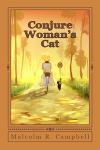 Malcolm R. Campbell is the author of “Conjure Woman’s Cat,” a 1950s-era story about granny vs. the KKK that will be 99¢ on Kindle February 4, 2016.
Malcolm R. Campbell is the author of “Conjure Woman’s Cat,” a 1950s-era story about granny vs. the KKK that will be 99¢ on Kindle February 4, 2016.
Learn more at: http://www.conjurewomanscat.com/



